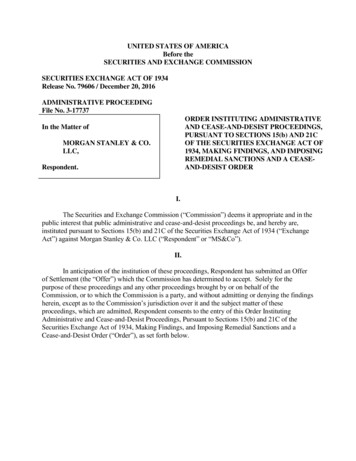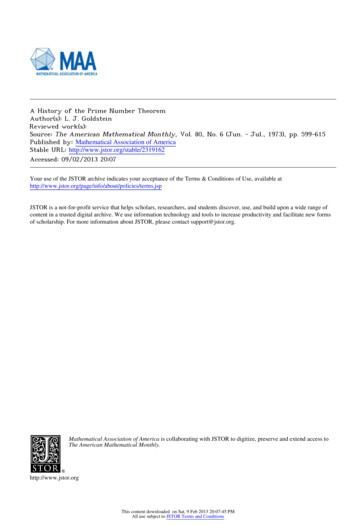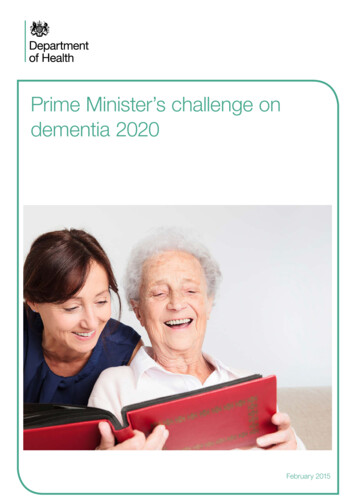
Transcription
Prime Minister’s challenge ondementia 2020February 2015
Contents 1Contents1. Prime Minister’s foreword32. Executive summary53. Why dementia remains a priority94. Progress on improving dementia care,support and research155. Transforming dementia care, support andresearch by 2020236. Conclusion49
2 Prime Minister’s challenge on dementia 2020
Prime Minister’s foreword 3Prime Minister’s forewordSince I became Prime Minister, fightingdementia – and helping those living with thecondition – has been a personal priority ofmine.The fall-out on people’s lives can be simplycatastrophic. Those coping with dementiaface the fear of an uncertain future; whilethose caring can see their loved ones slippingaway.Dementia also takes a huge toll on our healthand care services. With the numbers ofpeople with dementia expected to double inthe next 30 years and predicted costs likelyto treble to over 50 billion, we are facingone of the biggest global health and socialcare challenges – a challenge as big as thoseposed by cancer, heart disease and HIV/AIDS.But though the challenge is great, I believethat with the expertise of our scientists, thecompassion of our care workers, the stoicismof the British people – and with real politicalwill – we can meet this challenge.That’s why in March 2012 I launched anational challenge to fight dementia – anunprecedented programme of action todeliver sustained improvements in health andcare, create dementia friendly communities,and boost dementia research.Three years on and there has beensignificant progress – with more peoplenow receiving a diagnosis of dementia thanever before, over 1 million people trainedto be Dementia Friends to raise awarenessin local communities, and over 400,000 ofour NHS staff and over 100,000 social carestaff trained in better supporting peoplewith dementia. Our efforts on research havebeen world leading, with major researchand infrastructure programmes now inplace, supported by a doubling of researchspending on dementia. We now spend wellover 60 million on dementia research eachyear.Now I want to see this work taken to the nextlevel, building on all the brilliant work that’sbeen done in three short years.By 2020 I want England to be: the best country in the world for dementiacare and support and for people withdementia, their carers and families to live;and the best place in the world to undertakeresearch into dementia and otherneurodegenerative diseases.As we look to the future, it is clear that weall have a part to play. This is not just aboutfunding from government, or researchby scientists, but understanding andcompassion from all of us. Together, wecan transform dementia care, support andresearch.David CameronPrime Minister
4 Prime Minister’s challenge on dementia 2020
Executive summary 5Executive summaryWe are working harder than ever toimprove dementia care, to make Englandmore understanding of dementia, to findout more about the condition and to findnew treatments which delay onset, slowprogression or even cure dementia.There is still much more to be done as welook ahead to the next five years and thechallenges that need to be tackled.People with dementia have told us what isimportant to them. They want a society wherethey are able to say:1 I have personal choice and control overthe decisions that affect me. I know that services are designed aroundme, my needs and my carer’s needs.1Outcomes derived from the work of the DementiaAction Alliance. For more information please seehttp://www.dementiaaction.org.uk/
6 Prime Minister’s challenge on dementia 2020 I have support that helps me live my life. I have the knowledge to get what I need. I live in an enabling and supportiveenvironment where I feel valued andunderstood. I have a sense of belonging and of beinga valued part of family, community andcivic life. I am confident my end of life wishes willbe respected. I can expect a good death. I know that there is research going onwhich will deliver a better life for peoplewith dementia, and I know how I cancontribute to it.Informed by these outcomes, our vision isto create a society by 2020 where everyperson with dementia, and their carers andfamilies, from all backgrounds, walks of lifeand in all parts of the country – people ofdifferent ages, gender, sexual orientation,ability or ethnicity for example, receive highquality, compassionate care from diagnosisthrough to end of life care. This applies toall care settings, whether home, hospital orcare home. Where the best services andinnovation currently delivered in some parts ofthe country are delivered everywhere so thereis more consistency of access, care andstandards and less variation. A society wherekindness, care and dignity take precedenceover structures or systems.More broadly, we want a society wherethe public thinks and feels differently aboutdementia, where there is less fear, stigma anddiscrimination; and more understanding.We want people to be better informed aboutdementia and helped to take action, suchas through lifestyle changes, to reduce theirpersonal risk of developing the condition.People want hope for the future, to knowthat real progress is being made towardspreventing and treating dementia, and thatthere is a global effort to find a cure.This document sets out the areas wherethe government believes it will be necessaryfor society to take sustained action in orderto deliver this vision and to truly transformdementia care, support and research by2020.The Government’s key aspirations are that by2020 we would wish to see: Improved public awareness andunderstanding of the factors whichincrease the risk of developingdementia and how people can reducetheir risk by living more healthily. Thisshould include a new healthy ageingcampaign and access to tools suchas a personalised risk assessmentcalculator as part of the NHS HealthCheck. In every part of the country peoplewith dementia having equal accessto diagnosis as for other conditions,with an expectation that the nationalaverage for an initial assessmentshould be six weeks following areferral from a GP (where clinicallyappropriate), and that no one shouldbe waiting several months for an initialassessment of dementia.We want the person with dementia, alongsidetheir carer and family, to be at the heart ofeverything we do. Their wellbeing and qualityof life must be uppermost in the minds ofthose commissioning and providing services.There needs to be greater recognition thateveryone with dementia is an individual withspecific and often differing needs includingco-morbidities. Those with dementia and theircarers should be fully involved in decisions, not only about their own care, but also in thecommissioning and development of services.GPs playing a leading role in ensuringcoordination and continuity of carefor people with dementia, as part
Executive Summary 7of the existing commitment thatfrom 1 April 2015 everyone will haveaccess to a named GP with overallresponsibility and oversight for theircare. Every person diagnosed withdementia having meaningful carefollowing their diagnosis, whichsupports them and those aroundthem, with meaningful care beingin accordance with publishedNational Institute for Health and CareExcellence (NICE) Quality Standards.Effective metrics across the healthand care system, including feedbackfrom people with dementia andcarers, will enable progress againstthe standards to be tracked and forinformation to made publicly available.This care may include, for example: receiving information on whatpost-diagnosis services areavailable locally and how thesecan be accessed, through forexample an annual ‘informationprescription’. access to relevant advice andsupport to help and advise onwhat happens after a diagnosisand the support available throughthe journey. carers of people with dementiabeing made aware of and offeredthe opportunity for respite,education, training, emotional andpsychological support so that theyfeel able to cope with their caringresponsibilities and to have a lifealongside caring.All NHS staff having received trainingon dementia appropriate to their role.Newly appointed healthcare assistantsand social care support workers,including those providing care andsupport to people with dementia andtheir carers, having undergone trainingas part of the national implementationof the Care Certificate, with theCare Quality Commission asking forevidence of compliance with the CareCertificate as part of their inspectionregime. An expectation that socialcare providers provide appropriatetraining to all other relevant staff. All hospitals and care homes meetingagreed criteria to becoming adementia friendly health and caresetting. Alzheimer’s Society delivering anadditional 3 million Dementia Friendsin England, with England leading theway in turning Dementia Friends into aglobal movement including sharing itslearning across the world and learningfrom others. Over half of people living in areas thathave been recognised as DementiaFriendly Communities, accordingto the guidance developed byAlzheimer’s Society working with theBritish Standards Institute.2 Eacharea should be working towards thehighest level of achievement underthese standards, with a clear nationalrecognition process to reward theirprogress when they achieve this. Therecognition process will be supportedby a solid national evidence basepromoting the benefits of becomingdementia friendly. All businesses encouraged andsupported to become dementiafriendly, with all industry sectorsdeveloping Dementia Friendly2More information about the work of the BritishStandards Institute can be found athttp://shop.bsigroup.com/Navigate-by/PAS/
8 Prime Minister’s challenge on dementia 2020Charters and working withbusiness leaders to make individualcommitments (especially but notexclusively FTSE 500 companies).All employers with formal inductionprogrammes invited to includedementia awareness training withinthese programmes. National and local governmenttaking a leadership role with allgovernment departments and publicsector organisations becomingdementia friendly and all tiers of localgovernment being part of a localDementia Action Alliance. Dementia research as a careeropportunity of choice with the UKbeing the best place for DementiaResearch through a partnershipbetween patients, researchers,funders and society. Funding for dementia research ontrack to be doubled by 2025. An international dementia instituteestablished in England. Increased investment in dementiaresearch from the pharmaceutical,biotech devices and diagnosticssectors, including from smalland medium enterprises (SMEs),supported by new partnershipsbetween universities, researchcharities, the NHS and the privatesector. This would bring word classfacilities, infrastructure, drive capacitybuilding and speed up discovery andimplementation. Cures or disease modifyingtherapies on track to exist by 2025,their development acceleratedby an international framework fordementia research, enabling closercollaboration and cooperationbetween researchers on the useof research resources – includingcohorts and databases around theworld. More research made readily availableto inform effective service modelsand the development of an effectivepathway to enable interventions to beimplemented across the health andcare sectors. Open access to all public fundedresearch publications, with otherresearch funders being encouraged todo the same. Increased numbers of people withdementia participating in research,with 25 per cent of people diagnosedwith dementia registered on JoinDementia Research and 10 per centparticipating in research, up from thecurrent baseline of 4.5 per cent.
Why dementia remains a priority 9Why dementia remains a priorityWhat is dementia?The term ‘dementia’ describes a set ofsymptoms that include loss of concentrationand memory problems, mood and behaviourchanges and problems with communicatingand reasoning. These symptoms occur whenthe brain is damaged by certain diseases,such as Alzheimer’s disease, a series of smallstrokes or other neurological conditions suchas Parkinson’s Disease. Around 60 per centof people with dementia have Alzheimer’sdisease, which is the most common type ofdementia, around 20 per cent have vasculardementia, which results from problems withthe blood supply to the brain, and manypeople have a mixture of the two. There areother less commons forms of dementia,3 forexample dementia with Lewy bodies andfrontotemporal dementia.43Dementia resources, NHS Health Check4Dementia 2014: Opportunity for Change, Alzheimer’sSociety, September 2014.
10 Prime Minister’s challenge on dementia 2020Throughout this document, dementia isused as shorthand for this broad rangeof conditions. It is important, however, torecognise that no two people with dementiaor their carers are the same and individualswill have unique and differing needs.Dementia is a progressive condition, whichmeans that the symptoms become moresevere over time. People with dementia andtheir families have to cope with changingabilities such as the capacity to makedecisions about major life events as well asday-to-day situations.The reality for many people with dementiais that they will have complex needscompounded by a range of co-morbidities. Arecent survey by Alzheimer’s Society foundthat 72 per cent of respondents were livingwith another medical condition or disabilityas well as dementia. The range of conditionsvaried considerably, but the most commonones were arthritis, hearing problems, heartdisease or a physical disability.5Currently, dementia is not curable. However,medicines and other interventions can lessensymptoms for a period of time and peoplemay live with their dementia for many yearsafter diagnosis. There is also evidence thatmore can be done to delay the onset ofdementia by reducing risk factors and living ahealthier lifestyle.Advanced dementia can be very difficultfor the individual and their family and it isnot always possible at this late stage of thecondition to ‘live well’, but compassionatetreatment, care and support throughout theprogression of the condition is essential toenable people with dementia to one day ‘diewell’. There is also a great deal that can bedone to help people with dementia at theearlier stages. If diagnosed in a timely way,people with dementia and their carers can5Dementia 2014: Opportunity for Change, Alzheimer’sSociety, September 2014.receive the treatment, care and support(social, emotional and psychological, as wellas pharmacological) to enable them to bettermanage the condition and its impact. Forexample, there is much that can be done tohelp prevent and ameliorate symptoms suchas agitation, confusion and depression.The impact of dementia now andin the futureDementia is a growing, global challenge. Asthe population ages, it has become one ofthe most important health and care issuesfacing the world. The number of people livingwith dementia worldwide today is estimatedat 44 million people, set to almost double by2030.6In England, it is estimated that around676,000 people have dementia.7 Dementiahas, and will continue to have, a huge impacton people living with the condition, theircarers, families and society more generally assummarised below:Mortality Dementia is now one of the top fiveunderlying causes of death and one inthree people who die after the age of 65have dementia.8 Nearly two-thirds of people with dementiaare women, and dementia is a leadingcause of death among women – higherthan heart attack or stroke.96World Alzheimer’s Report 2014: Dementia and RiskReduction – an analysis of protective and modifiablefactors, Alzheimer’s Disease International, London,September 20147Estimated prevalence derived by NHS England fromDelphi 2007 and subject to review in the light ofDementia UK Update, second edition, November 20148Brayne C et al, Dementia before death in ageingsocieties – the promise of prevention and the reality,PLoS Med 2006;3; 109Dementia UK Update, second edition, Alzheimer’sSociety, November 2014
Why dementia remains a priority 11Brian Hennell was born in London in June 1938. In 1968 he married June, and theywent on to have three children. It was early in 2005 that Brian seemed to be changing,developing feelings of lesser wellbeing than he had had before. Mood swings andirrationality were noticed. At times he was irascible, unreasonable and unkind.June suspected that the decline in Brian’s feel-good factor was linked to his failing memory.They couldn’t go on this way and, having run out of self-help options, realized that the timehad come to involve their GP.In August 2008, June and Brian visited their GP who undertook simple tests on Brian.By late September 2008, a consultant old age physician was able to report, following athorough examination, that in his opinion there was no underlying medical reason for Brian’sdeteriorating condition and that he would benefit from referral to a memory clinic and thehelp of a consultant psychogeriatrician. He also ordered a CT head scan which showednothing abnormal.An initial assessment by a memory service followed a month later, but real progress wasmade when Brian was seen by the consultant psychogeriatrician.June’s diary reflects that this was a massive turning point for them and that the specialist waswonderful. After a three-hour consultation he gave a probable diagnosis of frontotemporaldementia, practical help such as advising about an Enduring Power of Attorney, consideringtheir home arrangements, and whether downsizing to live nearer family may be wise.Thanks to receiving a diagnosis, they could evaluate how to go forward. Having a diagnosisis really important for many reasons. It stops people worrying that something even moreserious, like a brain tumour, is causing the problem. It provides some light at the end of thetunnel.Next steps for the couple included: selling their large home of 26 years and downsizing to live near their two sons and theirfamilies in Gloucestershire, at their request, so that they would be on hand to providehelp and support. making Enduring Powers of Attorney. informing the Driver and Vehicle Licensing Agency (DVLA) of Brian’s difficulties andreceiving permission from them for him to keep driving for another year.‘Not every day is wonderful and there are certainly some difficult times – but we aregoing forward, taking risks and living life to the full. There is still confusion and the needto make adjustments, to be flexible and learn. Of the future, we both agree that this is anunknown quantity. We work closely as volunteers with the NHS and many other organisations.Both Brian and June have given and received positive help from support groups’.Hello, I’m me! Living well with dementia, Chapter 30, June and Brian Hennell, Oxford University Press
12 Prime Minister’s challenge on dementia 2020Prevalence Dementia mainly affects older people,and after the age of 65, the likelihood ofdeveloping dementia roughly doublesevery five years.10Estimating the prevalence of dementiain England is not an exact science.The Delphi approach is a consensusstatement based on experts reviewinga series of international studies whereasthe Cognitive Function and Ageing IIStudy (CFAS II) uses real data from threepopulations in England, allowing for moregranular estimates of prevalence, forexample at Clinical Commissioning Grouplevel, and indicates that there are ranges.compares to just over a two-fold increasein the number of people with dementiaacross the whole UK population in thesame time period.11 People with learning disabilities havea greater risk of developing dementiathan other people and usually developthe condition at a younger age. This isparticularly true of people with Down’ssyndrome, one in three of whom willdevelop dementia in their 50s.12Fear People over the age of 55 years feardementia more than any other disease.1339 per cent of over 55s fear gettingAlzheimer’s disease the most, comparedto 25 per cent who worry most aboutcancer.Dementia can start before the age of65, presenting different issues for theperson affected, their carer and theirfamily. People with young onset dementiaare more likely to have active familyCareresponsibilities – such as children ineducation or dependent parents – and There are around 540,000 carers14 ofare more likely to need and want an activepeople with dementia in England.15 It isworking life and income. Family membersestimated that one in three people willare more frequently in the position ofcare for a person with dementia in theirbecoming both the sole income earner,lifetime. Half of them are employed andas well as trying to ensure that theit is estimated that 66,000 people haveperson with young onset dementia isalready cut their working hours to makeappropriately supported.time for caring, while 50,000 people haveleft work altogether.The number of people with dementiafrom Black, Asian and Minority Ethnic11Dementia does not discriminate, All-Party Parliamentary(BAME) groups in the UK is expected toGroup on Dementia, July 2013rise significantly as the BAME population12Alzheimer’s Society; 2011 Learning disabilities andages. It is estimated that there are nearlydementia factsheet25,000 people living with dementia13http://cdn.yougov.com/today uk import/yg-archives from BAME backgrounds in d Wales. This number is expectedA carer is somebody who provides support or wholooks after a family member, partner or friend whoto grow to nearly 50,000 by 2026 andneeds help because of their age, physical or mentalover 172,000 by 2051. This is nearlyillness, or disability. This would not usually includea seven-fold increase in 40 years. Itsomeone paid or employed to carry out that role, orsomeone who is a volunteer.10Dementia UK: The Full Report, Alzheimer’s Society,2007.15Dementia 2014: Opportunity for Change, Alzheimer’sSociety, September 2014.
Why dementia remains a priority 13EconomyHospital care Dementia costs society an estimated 26 billion a year, more than the costs ofcancer, heart disease or stroke.16 It is estimated that if there was adisease- modifying treatment from 2020that delayed the onset of Alzheimer’sdisease by five years, by 2035 therewould be 425,000 fewer people withdementia, with accumulated savings from2020 of around 100 billion.17People with dementia are sometimes inhospital for conditions for which, were it notfor the presence of dementia, they wouldnot need to be admitted. An estimated25 per cent of hospital beds are occupied bypeople with dementia.19 A recent study estimated that by 2030,dementia will cost companies morethan 3 billion, with the numbers ofpeople who will have left employmentto care for people with dementia set torise from 50,000 in 2014 to 83,100 in2030. Yet if companies increased theiremployment rate of dementia carers byjust 2 per cent over the years to 2030, forexample by offering more flexible terms ofemployment, the retention of these skilledand experienced staff would deliver asaving of 415 million.18Businesses have started to recognisethis issue, with one in twelve companies(8 per cent) having made attempts toaccommodate the needs of a member ofstaff with dementia, and more than half(52.1 per cent) considering taking suchaction in the future.1816Dementia 2014: Opportunity for Change, Alzheimer’sSociety, September 2014.17Martin Knapp, Adelina Comas-Herrera, RaphaelWittenberg, Bo Hu, Derek King, Amritpal Rehill, BayoAdelaja (2014) Scenarios of Dementia Care: Whatare the Impacts on Cost and Quality of Life? London:PSSRU, LSE18Cost of dementia to business, Centre for Economic andBusiness Research, May 2014People admitted to hospital who also havedementia stay in hospital for longer, are morelikely to be readmitted and more likely todie than patients without dementia who areadmitted for the same reason.20Care homes and care at homeAn estimated one-third of people withdementia live in residential care andtwo-thirds live at home.Approximately 69 per cent of care homeresidents are currently estimated to havedementia.21People with dementia living in a carehome are more likely to go into hospitalwith avoidable conditions (such as urinaryinfections, dehydration and pressure sores)than similar people without dementia.LonelinessThe Alzheimer’s Society Dementia 2014survey reported that 40 per cent of peoplewith dementia felt lonely and 34 per cent donot feel part of their community.22 There is asimilar impact on the carer.19Counting the Cost – Caring for people with dementiaon hospital wards, Alzheimer’s Society 200920Care Quality Commission, Care update, Care QualityCommission, March 201321Dementia UK Update, second edition, Alzheimer’sSociety, November 201422Dementia 2014: Opportunity for change, Alzheimer’sSociety, September 2014.
14 Prime Minister’s challenge on dementia 2020
Progress on improving dementia care, support and research 15Progress on improving dementia care,support and researchSince the launch of the Prime Minister’sChallenge on Dementia,23 significant progresshas been made in improving health and carefor people with dementia and carers, creatingdementia friendly communities, and boostingdementia research. The Government hasalso initiated new work to lead internationalcollaboration across the world to accelerateefforts to improve the treatment and care ofthose with dementia.Improving health and care2324Prime Minister’s Challenge on Dementia – Deliveringmajor improvements in dementia care and research by2015, Department of Health, March 2012 Greater awareness of risk managementand reduction: Public Health England has adeveloping evidence base on risk reductionvia publication of the Blackfriars Consensus.24There is agreement that this is an area wherethere should be a greater focus and publichealth action. There is some evidence thatthe effects of vascular dementia can beThe Blackfriars Consensus on promoting brain health:reducing risks for dementia in the population, PublicHealth England and the UK Health Forum, May 2014
16 Prime Minister’s challenge on dementia 2020minimised or prevented altogether througha healthy lifestyle. Smoking and obesity, forexample, affect many types of dementia, inparticular vascular dementia.25, 26 Improved diagnosis rates: TheGovernment set the first ever nationalambition on dementia diagnosis that two thirds of the estimated number of peoplewith dementia should receive a diagnosisand appropriate post-diagnosis supportby March 2015 so that they can accessthe right care at the right time. In 2010/11in England less than half (42 per cent) ofthose estimated to have dementia werebeing diagnosed. The latest figures showthis has risen by 17 percentage points to59 per cent. Greater identification and referral ofdementia in hospitals: In the hospitalsetting, through NHS England’s DementiaCommissioning for Quality and Innovation(CQUIN) incentive27 (mandatory fromApril 2013), with around 4,000 referrals amonth, it is clear that more people withdementia in hospitals are being identifiedand assessed. Between April 2013and November 2014 there were 81,110referrals as a result of the introduction ofthis CQUIN incentive. More targeted inspection of dementiacare in hospitals: The Care QualityCommission (CQC) has committed toappointing a new national specialistadviser for dementia care. They will traininspectors across all inspecting teamsto understand what good dementia carelooks like so that their judgements areconsistent and robust. These judgementswill include a separate section in hospital25The Lancet Vol 377 March 19, 201126The Medical Research Council Cognitive Function andAgeing Study II, Medical Research Council, July 201327NHS England Commissioning for quality and innovation(CQUIN): 2014/15 guidance, NHS England, February2014inspection reports showing how wellhospitals care for people living withdementia. A better aware, educated and trainedNHS and social care workforce:Over 437,920 NHS staff have alreadyreceived Tier 1 (foundation level) dementiatraining28 and more than 100,000 socialcare workers have received dementiaawareness training. The College ofSocial Work is producing good practiceguidance for social workers to improvethe contribution that they can make inachieving best outcomes for people withdementia and carers. Supporting better provision ofpost-diagnosis support: TheGovernment’s mandate to NHS Englandfor 2015/16 includes a commitment toimprove diagnosis, treatment and care forpeople with dementia.29 This is supportedby the Government’s commitment thatfrom 1 April 2015 everyone, includingpeople with dementia, will be supportedby a named GP with overall responsibilityand oversight for their care. In February2014 the Secretary of State for Health setout his ambition that everyone diagnosedwith dementia should be offeredhigh quality support after receiving adiagnosis of dementia. This may includepersonalised information, a dementiaadviser, access to support services suchas counselling and ongoing specialistcare provided by specialist nurses. Tosupport GPs and other primary carestaff, an online Dementia Roadmap waslaunched in May 2014. The tool provides28Delivering high quality, effective, compassionate care:Developing the right people with the right skills andthe right values – A mandate from the Governmentto Health Education England, Department of Health,May 201429Mandate from the Government to NHS England:April 2015 to March 2016, Department of Health,December 2014
Progress on improving dementia care, support and research 17a framework that local areas can use toprovide local information about dementia.It is aimed at assisting primary care staffto more effectively support people withdementia and their carers. People newlydiagnosed with dementia and their carersare now able to sign up to a new emailservice on the NHS Choices website toget essential help and advice to supportthem to adjust to their recent diagnosis.
staff trained in better supporting people with dementia. Our efforts on research have been world leading, with major research and infrastructure programmes now in place, supported by a doubling of research spending on dementia. We now spend well over 60 million on dementia research each year. Now I want to see this work taken to the next

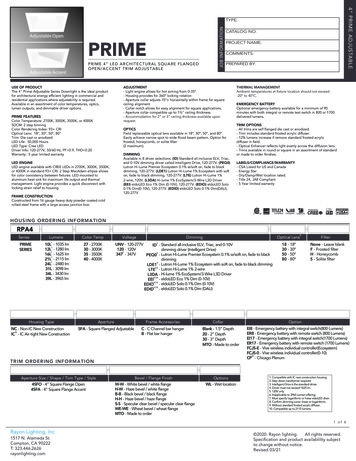
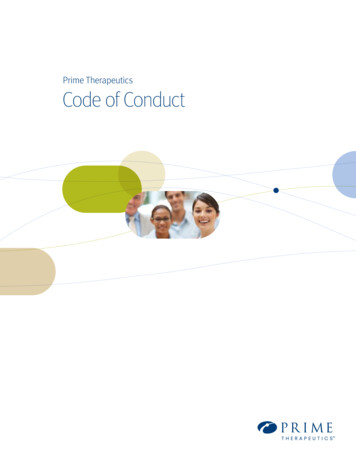

![Algorithms AppendixI:ProofbyInduction[Sp’16]](/img/13/98-induction.jpg)

